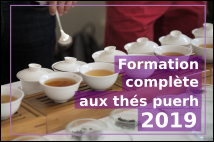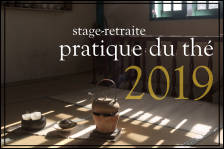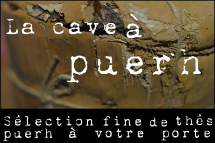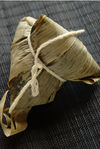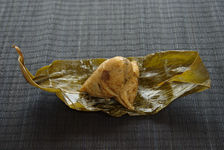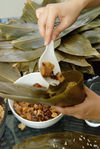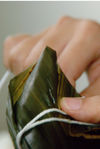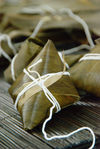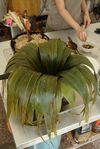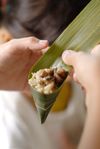 This page is not a real translation but just an automatic translation generated by computer of the original article, written in French language! Its not good... but better than nothing!
This page is not a real translation but just an automatic translation generated by computer of the original article, written in French language! Its not good... but better than nothing!Want to help us do diffuse puerh tea culture in english, by providing a better (or corrected) translation?
Please contact us!

It there's a long time in China during the period known as Spring and Autumn , between the 8th and 5th century BC was a state that was originally named Jing (荆), to become Jingchu (荆楚) and finally, just Chu (楚). Han in this state, established on the Yangtze River in an area originally inhabited by the Miao minority, lived a man named Qu Yuan (屈原).
Renowned poet, whose work is heavily inspired by shamanism, Qu Yuan is regarded in China as the creator of the personal poetry, and wrote the first long poem . Some of his works, preserved in the anthology Songs of Chu (楚辞) have persisted to this day including the famous poem The Sadness of Separation (离骚).
Secretary and adviser to King Huai, Qu Yuan was also involved in the political life of the Kingdom of Chu. But his advice were not heard by the king and the kingdom was finally overthrown in 278 by the Qin. In his grief and distress Qu Yuan committed suicide by jumping into the Miluo River.
Legend has it that seeing this, the surrounding population that the poet was a great respect, bolted rice in bamboo leaves, the ficelèrent to make small packets, and then threw them in the river water to attract and feed the fish, and avoid that they mutilate the body of the poet. The first zongzi (粽子) were born.
Is commemorated every year since his death and during the feast of Double Five , which takes place on the 5th day of 5th lunar month and is also more commonly called Dragon Boat Festival , for boat races in dragon form within them. The 5th day of 5th lunar month, the date in our calendar changes from year to year usually marks the beginning of the great heat of summer and, in Chinese belief, is the apogee of the energy Yang (阳) (the inverse of the ying 阴).
Across China on manufactures during this period, and in memory of the poet Qu Yuan, zongzi. This is, as the legend, small packets of sticky rice, wrapped in a pyramidal shape in a sheet (aromatic) and then tied, and which are then cooked in water or steam. On this basis there are a multitude of zongzi, which is accommodated to the rice pieces of meat, fried mushrooms, and many other things, savory or sweet.
While that in families the grandparents breed every year the zongzi their childhood, the smallest organized in the playground of competition for the best zongzi, each with of course the authentic zongzi Granny!
Markets in turn are filled with aromatic leaves and sticky rice for making zongzi, and for those who do not have to devote an afternoon to make their own zongzi, multiple vendors are proposing, and made baked on the premises.
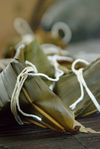
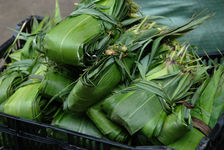
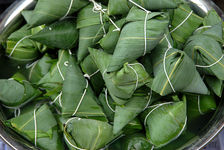
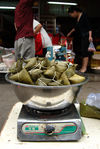
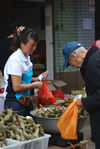
- 1. Zongzi
- 2. Leaves sold in markets for making Zongzi
- 3. Zongzi a market of Kunming
- 4. Zongzi cooking at a market in Kunming
- 5. Person buying zongzi
So far not too closely related to the tea until Jinuo Cha Shan Chang (基诺 山 茶厂), a "small" producer of the mountain Jinuo, I mentioned several times in previous articles and brimming original ideas mixing pleasure with tradition and innovation, has had the foresight to build on this tradition by offering the puerh (Pu Er tea) zongzi! This tea produced each year in very limited quantities and exclusively to the period zongzi, is compressed into a sheet as aromatic rice zongzi then tied with an elegant red ribbon.
I have not tasted those of the year, having taken me a little late and stocks disappearing at lightning speed, but I had kept some of last year in a bamboo box and c t is with pleasure that I opened a present for you.
 Chargement du thé...
Chargement du thé...
